
Using DevOps to create cloud projects that can grow effectively might initially seem overwhelming, especially with over 160 AWS services available. Determining the optimal combination of AWS services for speed and scalability requires patience, determination, and a willingness to learn and adapt. DevOps streamlines tasks such as server updates and scheduled serverless actions, while also supporting cloud best practices. However, the key is understanding which services to use and how to use them effectively.
- AWS DevOps services enable faster product innovation and release cycles using AWS DevOps tools, ensuring seamless service delivery. CEOs and CTOs partner with an AWS DevOps consulting company to tailor cloud DevOps services to their strategic objectives.
- With AWS’s pay as you go model and fully managed offerings, top executives can optimize infrastructure costs and eliminate operational overhead. DevOps on AWS and AWS DevOps tools empower teams to focus on core growth initiatives.
- AWS DevOps services deliver enterprise grade security management, automated backup, and large scale disaster recovery. CTOs and CIOs rely on an AWS DevOps consulting company for robust governance and unhindered expansion.
- Implement continuous integration and delivery pipelines with AWS DevOps tools to automate manual processes and accelerate time to market. DevOps on AWS fosters collaboration across development and operations, driving innovation for CEOs and all top executives.
When you start your DevOps with AWS journey in the Cloud, the first step is to learn how to plan, create, build, and test your application. After that, you can move on to managing new releases and deployments while closely monitoring how things are running. There are three helpful AWS consulting services: Lambda functions, CloudFormation, and CloudWatch. These services ensure your DevOps with AWS operations are smooth, focusing on getting your application out there. Let’s explore the differences between these AWS consulting services.
Connect With Our AWS DevOps Consultant
AWS DevOps Consulting Services
DevOps is essential for companies to make their software creation and release smoother in today’s fast changing tech world. Amazon Web Services (AWS) offers a range of tools and services specifically designed for DevOps. In this article, we’ll look at DevOps development and the different Azure DevOps services you can use. We will also check out the critical AWS DevOps tools that can help you start making software that works well and can grow.
Continuous innovation, timely releases, and seamless services are key factors that determine a company’s success and competitive edge in today’s IT business. In this rapidly evolving trend, gaps among teams in the Software Development Life Cycle (SDLC) can no longer be a hindrance.
The DevOps managed services process changed the scenario, bringing a new pace of progress in planning and executing tasks at the speed the industry demands. Once the speed and innovation rate is achieved, the next thing is ensuring ‘seamless services.’ That’s where Amazon Web Services (AWS) arrived as a savior.
The AWS DevOps combination has proven that a faster rate of product innovation and release, coupled with seamless functionality and services, is a success story.
AWS DevOps best practices in place can help you:
- Effectively provision and manage infrastructure
- Gauge infrastructure performance regularly
- Easily deploy application code
- Build and deliver products with high reliability
- Automate software releases
- Monitor applications around the clock
What is DevOps? DevOps is a team based and automated approach to developing software. It’s about eliminating barriers between teams, automating tasks, and consistently releasing new software updates. The goal of DevOps in AWS is to enable teams to work more effectively together, complete tasks faster, and ensure that software updates are of high quality. It achieves this by using methods such as continuous integration, regular updates, and new feature implementation.
Imagine DevOps as a bridge that connects developers and operations teams, enabling them to collaborate smoothly. It fosters a culture where everyone shares responsibility, collaborating from the initial stages of software development through to its implementation. DevOps in AWS breaks down barriers and fosters effective communication, enabling faster, more efficient software development.
Automation plays a crucial role in DevOps managed services. It automates repetitive tasks, such as building, testing, and deploying software, so people don’t have to do them manually, saving time and reducing the likelihood of mistakes. With automation, teams can receive feedback more quickly and resolve issues faster, enabling them to meet customer needs more efficiently. When routine jobs are automated, the DevOps managed services team can focus on developing new ideas and providing users with valuable information.
Useful link: Future of DevOps: Top DevOps Trends in 2025 and Beyond
Types of DevOps
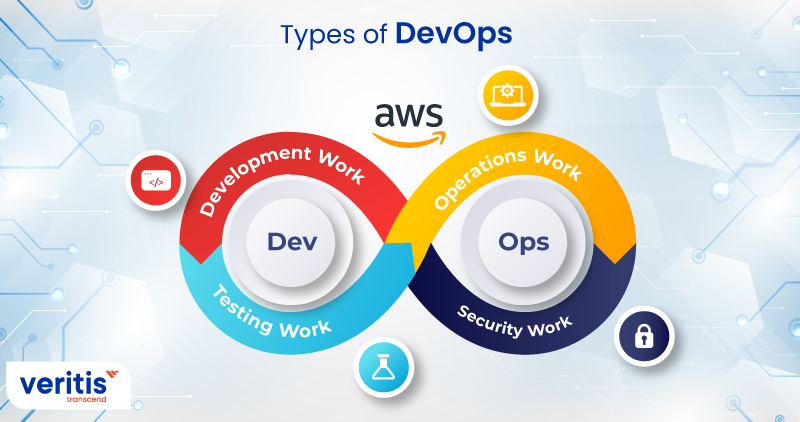
In DevOps, teams do four main types of tasks:
1) Development Work
This part of DevOps in AWS involves developing and maintaining the code used in applications. It involves writing software that adds new features, fixes existing issues, and enhances overall functionality. It’s like building the foundation and adding new rooms to a house to make it more comfortable and functional. Just as a house requires regular maintenance and improvements, so does the code in applications to keep them running smoothly and up to date.
2) Testing Work
Testing involves ensuring the software works correctly and meets the standards. This includes creating testing plans, using automated tools and human checks, and confirming that the software does what it should.
Imagine baking a cake, you wouldn’t serve it to others without ensuring it tastes good and looks right. Similarly, testing in DevOps is like ensuring that the “cake” (software) is delicious and well presented before sharing it with users. This step ensures the software functions as expected and delivers a satisfying user experience.
3) Operations Work
Operations work involves managing the software’s environment and setup and ensuring everything runs smoothly. This involves preparing servers, configuring network settings, and monitoring system performance.
Think of operations work as a caretaker for a garden. They ensure that the soil, water, and plants are in the proper condition for the garden to thrive. Similarly, in DevOps as a service, operations work ensures that the technical “garden” where the software grows is well maintained and optimal. This work helps keep the software running efficiently and users satisfied.
4) Security Work
Security work focuses on protecting software and its environment from potential risks. This involves identifying and fixing security vulnerabilities, implementing protective measures, and ensuring that the software adheres to security rules.
Imagine security work as a vigilant guard for a valuable treasure. Just as a guard monitors threats and takes action to prevent them, security professionals in DevOps monitor software to prevent harmful breaches. By doing this, security work ensures that both the software and the data it handles are well protected.
These four types of work, development, testing, operations, and security work together like a well coordinated team. They collaborate to ensure the software is built, tested, deployed, and secured effectively, creating a successful DevOps approach.
What is AWS?
Cloud computing has become highly popular, giving users numerous options for cloud providers, including Google Cloud, Microsoft Azure, and IBM Cloud Services. AWS stands for Amazon Web Services, Amazon’s cloud provider. AWS offers multiple services and features like security, computing power, and databases, as you’d find in an on site data center. It’s widely considered one of the largest cloud providers.
What is AWS DevOps?
AWS DevOps is Amazon’s approach to using its cloud platform and specific tools for implementing the DevOps philosophy. In their own words, “AWS offers flexible services to help companies quickly build and deliver products using AWS and DevOps practices. These services simplify tasks like setting up infrastructure, deploying code, automating software releases, and monitoring performance.”
With AWS DevOps, developer teams can efficiently implement continuous integration and continuous delivery (CI/CD). This allows them to securely store and version the application code and then automatically build, test, and deploy it to AWS or on-premises environments.
Useful link: Building a High Performing DevOps Culture: Strategies and Best Practices for CEOs and CTOs
AWS Add on to DevOps Path

The following features describe how supportive AWS consultants can be in achieving success through DevOps implementation:
1) Easy Start: All you need to get started with AWS is to have an account with it, and you may not require any additional setup
2) Fully Managed: AWS fully managed services manage operating infrastructure. Quickly hand it off to AWS resources and continue focusing on the core product.
3) Highly Scalable: Manage to scale from a single instance to thousands of them with flexible compute resources offered by AWS consultants and avail easy provisioning, configuration, and scaling benefits.
4) Customize: You can enjoy the flexibility of using the AWS Command Line Interface, APIs, and SDKs for every available service. Declarative AWS CloudFormation templates can also help you model and provision the available AWS resources and your entire AWS infrastructure.
5) Automate: With AWS automation service provisioning, you can easily automate manual tasks such as deployments, container management, development and test workflows, and configuration management.
6) Secure: Use AWS Identity and Access Management (IAM) to set your permissions and policies and gain control over resource allocation and access.
7) Wide Base: AWS has many business associates in its partnership bank, which helps one expand their business services beyond limits. With AWS, one can choose from third party and open source tools and develop an end to end solution.
8) Pay As You Go: AWS consulting services offer flexibility to use services as and when required and only pay as you move onto them. One can forget prior payments, termination penalties, or long term contracts with AWS. AWS Free Tier is there to help you out.
What more? Get AWS and tap the full potential of your AWS backed DevOps as a managed service process.
AWS DevOps Toolchain

Empowering DevOps Through AWS
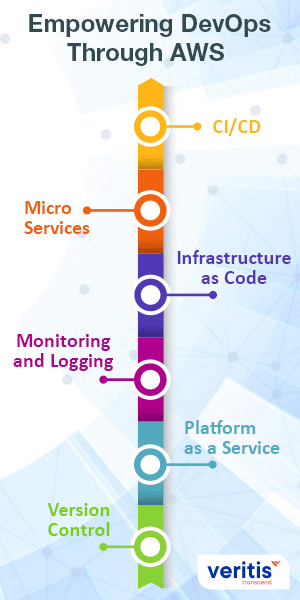
AWS consultants provide services that make your DevOps journey more successful than ever. Automate manual tasks, manage complex environments with high scalability, and boost your DevOps engineers, all possible with AWS automation tools.
AWS performs best when working with DevOps tools. Let’s take a snapshot of DevOps tooling by AWS:
1) Continuous Integration and Continuous Delivery
Develop a continuous integration and continuous delivery pipeline across the process chain using:
- AWS Code Pipeline for Software Release Workflows
- AWS Code Build for Build and Test Code operations
- AWS Code Deploy for Deployment Automation
- AWS Code Star for Unified CI/CD projects
2) Micro Services
Enjoy the benefits of microservices architecture with practical usage of containers and serverless computing with:
- Amazon Elastic Container Service for Production Docker Platform
- AWS Lambda for Serverless Computing
3) Infrastructure as Code
Manage your AWS infrastructure resources effectively using code and templates:
- AWS CloudFormation for Templated Infrastructure Provisioning
- AWS Ops Works for Chef Configuration Management
- AWS Systems Manager for Configuration Management
- AWS Config for Policy as Code
4) Monitoring and Logging
Get real time monitoring of infrastructure performance and save logs:
- Amazon CloudWatch for Cloud and Network Monitoring
- AWS X Ray for Distributed Tracing
- AWS CloudTrail for Activity and API Usage Tracking
5) Platform as a Service
Quickly deploy web applications without worrying about infrastructure management and application stack:
- AWS Elastic Beanstalk for Running and Managing Web Apps
6) Version Control
AWS automation tools provide you with secure, highly scalable Git repositories in the cloud DevOps services:
- AWS Code Commit for Private Git Hosting
With all its features, one can gauge how effective AWS DevOps can be for an IT organization.
Choosing a Right Service AWS DevOps Service Provider
As you realize the benefits of combining AWS DevOps tools, the real quest begins for the right consulting partner.
Given its broad expertise working with clients across various verticals, Veritis can offer AWS and DevOps Consulting services that meet your business requirements.
Choosing the right AWS DevOps service provider starts with assessing their credentials as an AWS DevOps consulting company. Look for proven AWS DevOps services and mastery of AWS DevOps tools to streamline your CI/CD pipelines. The ideal AWS DevOps consulting company also delivers comprehensive cloud DevOps services that align with your business objectives. With deep DevOps on AWS expertise and robust AWS DevOps services, you’ll accelerate innovation and reduce risk.
An effective AWS DevOps consulting company integrates AWS DevOps tools and AWS DevOps services to optimize workflows and minimize downtime. They offer scalable cloud DevOps services that grow with your enterprise. By embedding DevOps best practices on AWS and leveraging AWS DevOps expertise, they ensure continuous delivery and faster time to market. Investing in proven AWS DevOps services, robust AWS DevOps tools, and scalable cloud DevOps services positions your organization for sustained success.
Many enterprises ask how DevOps on AWS drives digital transformation. AWS DevOps services deliver end to end CI/CD pipelines, release management, and governance, while AWS DevOps tools like CodePipeline and CodeBuild enable seamless workflows. Engaging an AWS DevOps consulting company ensures tailored cloud DevOps services that accelerate delivery and strengthen security. By leveraging AWS DevOps tools alongside expert AWS DevOps services, teams automate processes, reduce risk, and achieve continuous innovation on AWS. Partner with a leading AWS DevOps consulting company to fully capitalize on cloud DevOps services and transform your DevOps on AWS journey.
Useful link: AIOPS Solutions: Enhancing DevOps with Intelligent Automation for Optimized IT Operations
Veritis AWS DevOps Offerings

We have designed our offerings after carefully analyzing business processes, market trends, and customer preferences. Below are our AWS DevOps service offerings:
1) AWS Assessment Services
We design a cloud deployment strategy that helps you maximize your AWS experience. Veritis team of cloud experts will complete an assessment of your existing infrastructure and automation setup, understand the differences between the existing framework and the desired outcome, and create an action plan to remedy the current scenario.
Our team will assess your existing AWS monitoring practices and identify tools that deliver DevOps operational benefits to your business.
2) AWS Migration Services
Our Migration services are designed to ease your AWS Migration process. Veritis team of experts can migrate your entire workload setup, including applications and databases, to AWS, from a current cloud DevOps services platform or on-premises center.
Experience lasting uptime and optimal performance with our hassle free AWS migration services! Besides, we also offer capacity expansion, disaster recovery failover, and governance as part of our AWS migration services.
3) DevOps on AWS Cloud
Our ‘DevOps on AWS Cloud’ services enable you to automate your delivery pipeline throughout the cycle. With more than a decade of experience in DevOps on AWS, we have built complex cloud architectures on Amazon Web Services. We have also developed in depth expertise in provisioning distributed application systems using cloud DevOps services.
4) AWS Managed Services
With infrastructure as the center of focus, we have a range of tailored AWS managed services that help you make the most of your organization’s infrastructure, including:
- Performance Optimization
- Cost Optimization
- Security Management
- Monitoring
- Backup and Disaster Recovery
- Cloud and Operational Architecture
- Managing OS Updates
ROI and Business Metrics
Industry research consistently shows that organizations implementing robust AWS DevOps services achieve measurable business outcomes. Companies leveraging DevOps on AWS typically see:
A) Cost Reduction Metrics
- 20–30% reduction in infrastructure costs through automated resource optimization with AWS DevOps tools
- 40–60% fewer deployment incidents and rollbacks
- 35% less manual testing and deployment effort
B) Revenue Growth Indicators
- 50% faster delivery of new features and products, driving competitive advantage with cloud DevOps services
- 25% boost in customer satisfaction thanks to improved uptime
- 200% increase in deployment frequency without sacrificing quality
C) Operational Efficiency Gains
- 90% reduction in mean time to recovery (MTTR)
- 70% improvement in team productivity through automation enabled by AWS DevOps tools
- 80% faster onboarding of new team members via standardized DevOps on AWS processes
Competitive Advantage Through DevOps Transformation
Organizations seeking to maximize ROI partner with an AWS DevOps consulting company to tailor cloud DevOps services around their unique needs. With expert guidance, they deploy the right AWS DevOps tools and AWS DevOps services at speed, achieving rapid execution and organizational readiness.
Companies that successfully implement Azure DevOps services typically outperform competitors by:
- Responding to market changes 5x faster than traditional development cycles
- Reducing security vulnerabilities by 60% through automated compliance checks
- Achieving 99.9% uptime compared to the industry average of 99.5%
Industry Specific Use Cases and Applications
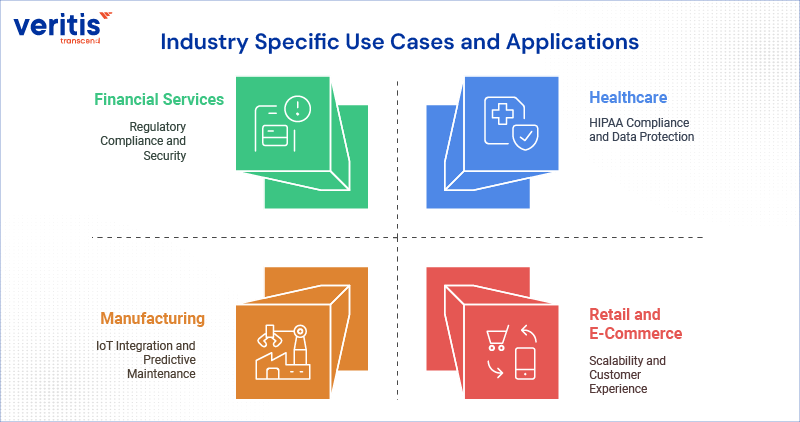
A) Financial Services: Regulatory Compliance and Security
Financial institutions leveraging DevOps on AWS achieve compliance automation without compromising security. An investment bank cut audit prep from 6 months to 2 weeks using AWS DevOps services and AWS DevOps tools for automated compliance monitoring.
Key Benefits:
- Automated SOX compliance reporting with cloud DevOps services
- Real time fraud detection system deployment via AWS DevOps tools
- Secure API gateway management for mobile banking
B) Healthcare: HIPAA Compliance and Data Protection
Healthcare organizations require specialized AWS DevOps services that safeguard patient data and meet strict regulations. Partnering with an AWS DevOps consulting company ensures tailored workflows and automated compliance validation.
Implementation Highlights:
- Automated HIPAA compliance checks using AWS DevOps tools
- Secure patient data pipeline management with cloud DevOps services
- Rapid telemedicine platform deployment during emergencies
C) Manufacturing: IoT Integration and Predictive Maintenance
Manufacturers use DevOps on AWS to orchestrate complex IoT ecosystems and predictive maintenance. With AWS DevOps services and AWS DevOps tools, they enable real time analytics and proactive upkeep.
Operational Benefits:
- 30% drop in unplanned downtime through predictive analytics
- Real time quality control system deployment via AWS DevOps tools
- Automated supply chain optimization with cloud DevOps services
D) Retail and E-Commerce: Scalability and Customer Experience
Retailers implement AWS DevOps services to manage seasonal surges and elevate customer satisfaction. Engaging an AWS DevOps consulting company ensures seamless scaling and high availability.
Performance Improvements:
- 99.99% uptime during peak events
- Sub second response times powered by AWS DevOps tools
- Automated inventory management across channels using cloud DevOps services
Competitive Analysis AWS DevOps Services vs Azure DevOps
1) Market Position and Strategic Considerations
- AWS DevOps services lead with a comprehensive portfolio of 200+ offerings and unmatched global infrastructure, making DevOps on AWS the go to for scalability and reliability.
- Azure DevOps excels in Microsoft ecosystem integration and enterprise compliance, but organizations seeking best in class cloud DevOps services often pair it with AWS DevOps tools.
- Engaging an AWS DevOps consulting company ensures you leverage AWS DevOps services’ mature partner network and security capabilities for end to end governance.
2) Multi Cloud DevOps Strategy
A) Strategic Benefits:
- Diversify risk by combining DevOps on AWS with Azure DevOps tools, tapping cloud DevOps services across providers.
- Optimize costs through competitive pricing and rightsizing with AWS DevOps services and Azure offerings.
- Select best of breed capabilities by integrating AWS DevOps tools alongside Azure pipelines.
B) Implementation Considerations:
- Increased orchestration complexity demands an AWS DevOps consulting company to design unified workflows.
- Requires cross platform skillsets for DevOps on AWS and Azure DevOps expertise.
- Data transfer costs may arise, so leverage cloud DevOps services for efficient multi networking and governance.
Implementation Timeline and Roadmap
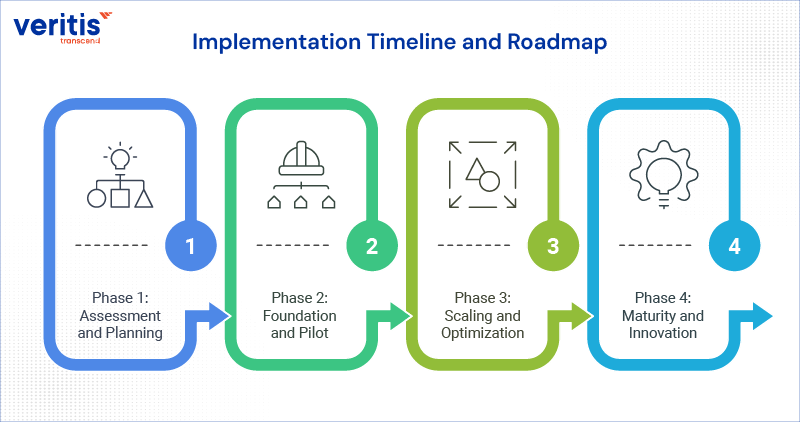
1) Phase 1: Assessment and Planning (Months 1 to 2)
A) Infrastructure Assessment
- Current system inventory and dependency mapping
- Security and compliance gap analysis
- Team skill assessment and training needs identification
B) Strategic Planning
- DevOps maturity assessment using industry frameworks
- Business case development with ROI projections
- Vendor evaluation, including Azure DevOps consulting options
2) Phase 2: Foundation and Pilot (Months 3 to 6)
A) Infrastructure Setup
- Core AWS services configuration
- CI/CD pipeline establishment
- Monitoring and alerting system implementation
B) Pilot Project Selection
- Non critical application identification for initial deployment
- Success metrics definition and baseline establishment
- Team training on new tools and processes
3) Phase 3: Scaling and Optimization (Months 7 to 12)
A) Production Deployment
- Critical application migration to DevOps pipeline
- Performance optimization and cost management
- Integration with existing systems and processes
B) Organizational Change
- Culture transformation and change management
- Advanced training on DevOps services and best practices
- Continuous improvement process establishment
4) Phase 4: Maturity and Innovation (Months 13+)
A) Advanced Capabilities
- AI/ML integration for predictive analytics
- Advanced security and compliance automation
- Multi cloud orchestration and management
B) Innovation Focus
- Emerging technology evaluation and adoption
- Continuous optimization and cost management
- Strategic partnership development
Integration Challenges and Solutions
1) Legacy System Integration
Organizations face significant challenges when integrating legacy systems with modern DevOps services. Success requires careful planning and a phased approach:
A) Common Integration Challenges
- Monolithic architecture limitations
- Database migration complexities
- API compatibility issues
- Security and compliance gaps
B) Proven Solutions
- Microservices architecture adoption
- API gateway implementation
- Database replication and synchronization
- Automated testing and validation
2) Hybrid Cloud Scenarios
Many enterprises operate in hybrid environments, combining on-premises infrastructure with cloud services. This complexity requires sophisticated orchestration:
A) Hybrid Challenges
- Network connectivity and latency issues
- Data synchronization across environments
- Security policy enforcement
- Consistent monitoring and management
B) Proven Solutions
- VPN and direct connect implementation
- Data replication and backup strategies
- Unified security framework deployment
- Centralized monitoring and alerting
Performance Benchmarks and Scalability
1) Scalability Metrics and Targets
AWS DevOps platforms demonstrate impressive scalability characteristics when properly configured:
A) Horizontal Scaling
- Support for 10,000+ concurrent users
- Auto scaling from 1 to 1,000 instances in minutes
- Global load balancing across multiple regions
B) Vertical Scaling
- CPU and memory scaling without downtime
- Storage expansion up to petabyte scale
- Network bandwidth scaling to 100 Gbps
2) Performance Optimization Strategies
Organizations implementing DevOps services must focus on performance optimization from day one:
A) Application Performance
- Response time targets: <100ms for API calls
- Throughput goals: 10,000+ transactions per second
- Error rate objectives: <0.1% for critical operations
B) Infrastructure Performance
- Resource utilization optimization: 70 to 80% CPU utilization
- Cost optimization: 20 to 30% reduction through rightsizing
- Availability targets: 99.9% uptime for critical services
When comparing these metrics with what Azure DevOps can deliver, organizations find similar performance characteristics, though specific implementations may vary based on workload requirements and architectural decisions.
Risk Management and Compliance Framework
1) Regulatory Compliance Considerations
Modern enterprises must navigate complex regulatory environments while implementing DevOps services:
A) SOC 2 Compliance
- Automated security control monitoring
- Continuous compliance validation
- Audit trail generation and management
B) GDPR Compliance
- Data privacy and protection automation
- Right to erasure implementation
- Consent management integration
C) HIPAA Compliance
- Patient data encryption and access control
- Audit logging and monitoring
- Breach detection and notification
D) Industry Specific Requirements
- PCI DSS for payment processing
- FISMA for government contractors
- ISO 27001 for international operations
2) Disaster Recovery and Business Continuity
Comprehensive disaster recovery planning is essential for DevOps implementations:
A) Recovery Time Objectives (RTO)
- Critical systems: 15 minutes
- Important systems: 1 hour
- Non critical systems: 4 hours
B) Recovery Point Objectives (RPO)
- Critical data: 5 minutes
- Important data: 30 minutes
- Non critical data: 2 hours
C) Business Continuity Planning
- Multi region deployment strategies
- Automated failover mechanisms
- Regular disaster recovery testing
3) Vendor Lock in Mitigation
Organizations must carefully consider vendor lock in risks when implementing cloud DevOps strategies:
A) Risk Mitigation Strategies
- Multi cloud architecture design
- Containerization and orchestration
- Open source tool integration
- Regular vendor evaluation and negotiation
B) Exit Strategy Planning
- Data portability and migration planning
- Skill development across multiple platforms
- Contract negotiation with favorable terms
- Regular competitive analysis and benchmarking
Organizational Impact and Change Management
1) Team Restructuring and Skill Development
Successful DevOps transformation requires significant organizational change:
A) Organizational Structure Changes
- Cross functional team formation
- Elimination of traditional IT silos
- Agile methodology adoption
- Continuous improvement culture
B) Skill Development Requirements
- Cloud platform expertise (AWS, Azure)
- Automation and scripting capabilities
- Security and compliance knowledge
- Agile and DevOps methodology training
2) Training and Adoption Strategies
Organizations must invest significantly in training to maximize the value of DevOps services:
A) Training Program Components
- Cloud platform certification programs
- Hands on workshop and labs
- Mentorship and peer learning
- Continuous learning and development
B) Adoption Strategies
- Gradual rollout with pilot projects
- Change champion identification and development
- Regular communication and feedback loops
- Success story sharing and recognition
Companies often evaluate both AWS training programs and Azure DevOps consulting services to determine the best approach for their specific needs and existing skill sets.
Success Metrics and KPIs
Measuring DevOps transformation success requires comprehensive metrics:
1) Technical Metrics
- Deployment frequency and success rate
- Mean time to recovery (MTTR)
- Change failure rate
- System availability and performance
2) Business Metrics
- Time to market for new features
- Customer satisfaction scores
- Revenue impact from faster releases
- Cost reduction through automation
3) Organizational Metrics
- Employee satisfaction and retention
- Skill development and certification
- Team productivity and collaboration
- Innovation and experimentation rate
Current Market Trends and Future Outlook
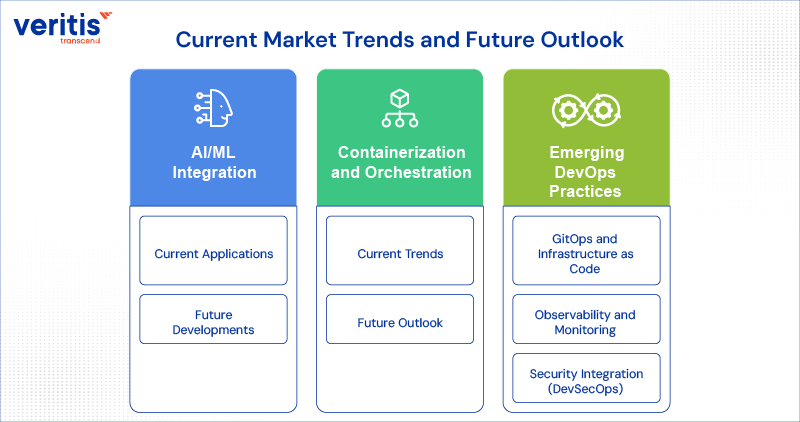
1) AI/ML Integration in DevOps
The integration of AI and ML into DevOps services represents a significant trend:
A) Current Applications
- Predictive analytics for system failures
- Automated testing and quality assurance
- Intelligent resource optimization
- Security threat detection and response
B) Future Developments
- Self healing infrastructure systems
- Autonomous deployment and rollback
- Intelligent capacity planning
- Advanced predictive maintenance
2) Containerization and Orchestration
Container technologies continue to reshape DevOps environments:
A) Current Trends
- Kubernetes adoption for orchestration
- Microservices architecture implementation
- Serverless computing integration
- Container security and compliance
B) Future Outlook
- Edge computing integration
- Advanced service mesh implementations
- Improved developer experience tools
- Enhanced security and governance
Organizations evaluating Azure DevOps tools in the context of containerization find robust support for these technologies, although implementation approaches may differ from AWS centric strategies.
3) Emerging DevOps Practices
Several emerging practices are shaping the future of DevOps services:
A) GitOps and Infrastructure as Code
- Declarative infrastructure management
- Version controlled infrastructure changes
- Automated drift detection and correction
- Enhanced security through code review
B) Observability and Monitoring
- Application performance monitoring (APM)
- Distributed tracing and logging
- Real time alerting and notification
- Predictive analytics for performance
C) Security Integration (DevSecOps)
- Security automation and testing
- Compliance as code implementation
- Vulnerability scanning and management
- Zero trust security architecture
Total Cost of Ownership Analysis
1) Comprehensive Cost Breakdown
Understanding the total cost of ownership for DevOps implementations requires detailed analysis:
A) Direct Costs
- Cloud infrastructure and services: 40 to 50% of total cost
- Software licensing and subscriptions: 15 to 20%
- Professional services and consulting: 20 to 25%
- Training and certification: 10 to 15%
B) Hidden Costs
- Data transfer and bandwidth charges
- Backup and disaster recovery services
- Security and compliance tools
- Monitoring and alerting systems
C) Ongoing Operational Costs
- Personnel and skill development
- Continuous training and certification
- Vendor management and optimization
- Regular security and compliance audits
2) Cost Optimization Strategies
Organizations can implement several strategies to optimize DevOps costs:
A) Resource Optimization
- Automated resource scaling and rightsizing
- Reserved instance and spot instance utilization
- Multi cloud cost comparison and optimization
- Regular cost review and optimization
B) Operational Efficiency
- Automation of manual processes
- Self service capabilities for development teams
- Standardized deployment and configuration
- Continuous monitoring and optimization
When comparing AWS costs with Azure DevOps consulting services, organizations often find that they have similar cost structures. However, specific pricing models and optimization opportunities may differ based on usage patterns and contract negotiations.
Industry Insight: DevOps Enterprise Management for Oil & Gas Sector
Our collaboration with a major oil and gas service provider is a prime example of how AWS powered DevOps solutions can streamline enterprise management and improve operational workflows. The project focused on implementing scalable DevOps practices to support complex infrastructure needs and business agility.
Read the complete case study here: DevOps Enterprise Mgmt Support for Oil & Gas Service Provider
Conclusion
AWS DevOps services offer a robust and seamless path for organizations embarking on their DevOps journey. By leveraging these services, teams can streamline their development and deployment processes, break down silos, and foster a culture of collaboration and innovation. AWS managed services provide a comprehensive suite of tools that automate tasks, enhance efficiency, and promote continuous integration and delivery. This, in turn, enables teams to respond swiftly to market demands, deliver high quality software, and confidently achieve their business objectives.
As organizations navigate the ever evolving technological landscape, AWS DevOps services are a reliable companion, empowering them to achieve efficient, scalable, and successful software delivery. With Veritis, a leading DevOps services company and a proud recipient of the Stevie Award, organizations have a trusted partner to guide and support them on their DevOps journey, ensuring optimal utilization of these services and driving transformative outcomes.
Got Questions? Schedule A Call
Also Read:
- DevOps on AWS: An Introduction on How to Integrate Seamlessly
- Top 6 IoT Trends to Drive Innovation for Business
- Building a High Performing DevOps Culture: Strategies and Best Practices for CEOs and CTOs
- Veritis Bags the CIO Review Award for Its Exceptional DevOps Solutions
- DevSecOps Implemention : Enhancing Security for an Energy Services Firm
- DevOps outsourcing: Things to Know About Before Getting Started